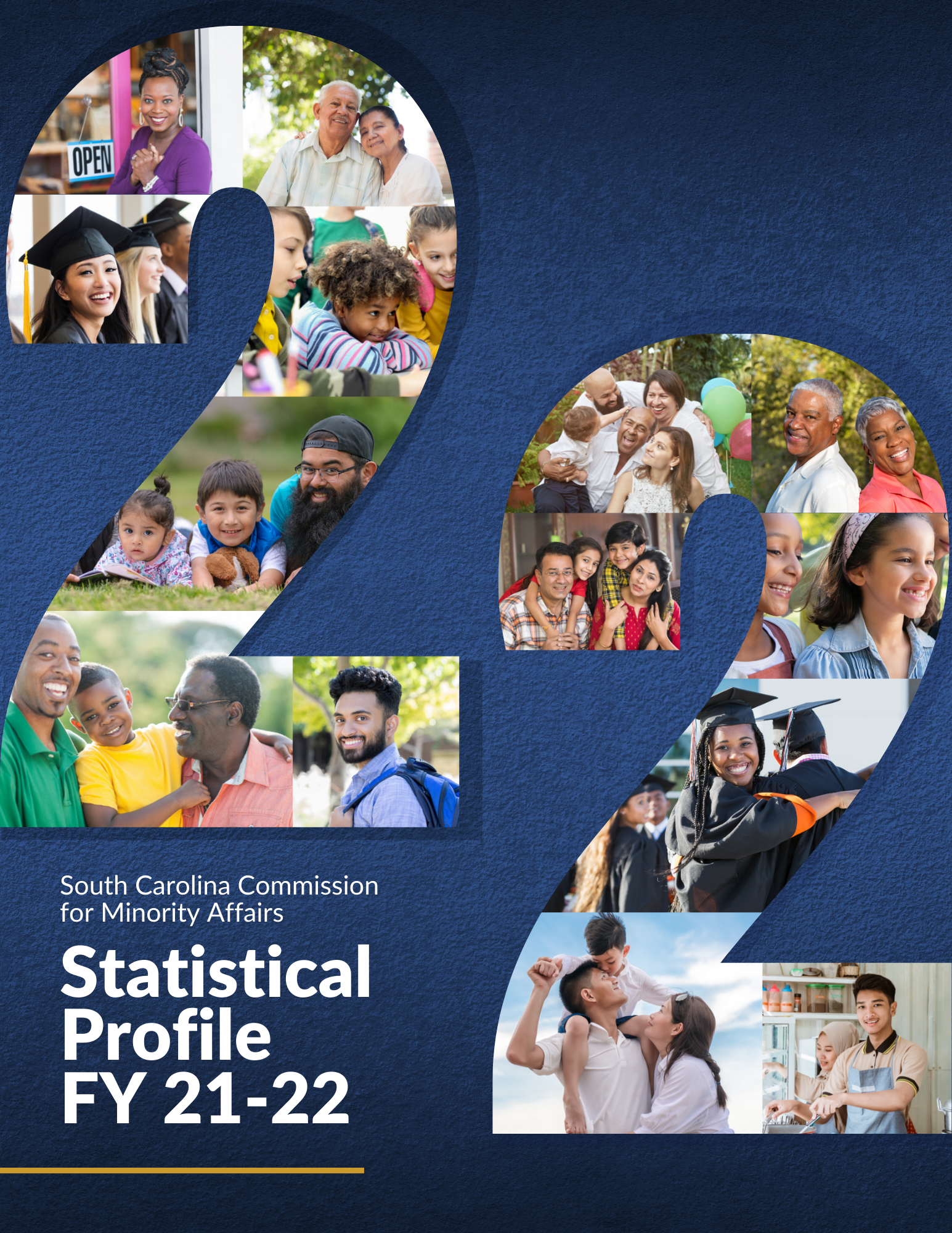In the News
 The Official Web Site of the State of South Carolina
The Official Web Site of the State of South Carolina

The South Carolina Commission for Minority Affairs released its FY2021-2022 Statistical Profile, a comprehensive report on the socio-economic conditions faced by the state’s ethnic minority communities, during a luncheon for community partners on Monday, February 27, 2023. The Statistical Profile serves to frame policy discussions around the importance of targeted interventions across a range of issues affecting minority communities today.
Download the Statistical Profile FY2021-2022 - PDF
Statistical Profile Presentation-PDF

The Research Briefs provides a snapshot of the latest analysis of topics that are of interest to policymakers, practitioners, researchers, government agencies, colleges/universities and the general public. If you have any questions concerning the research methodology, contact Dr. Robert Fenton, Director of Research, at rfenton@cma.sc.gov.
2024 Briefs
March 2024
Unattainable Dreams: Housing Affordability in South Carolina
In our latest research brief, Statistician Max Petushko examines new data sources and releases to further explore dynamics addressed in the July 2022 brief "Unaffordable Housing." By integrating data from the Bureau of Labor Statistics (bls.gov) and Federal Reserve Economic Data (fred.stlouisfed.org), this research spotlights major socioeconomic dynamics and connections between affordable housing, vacant houses, and householder age patterns in South Carolina. (DOWNLOAD PDF)
2023 Briefs
December 2023
Comparing 2022 American Community Survey 1-Year Estimates with Recent Years
In our latest research brief, Research and Statistical Analyst Zhengyang Lin explores changes in key facets of the state’s minority demographics – ranging from population to education attainment – by comparing the 2021 and 2022 American Community Survey (ACS). (DOWNLOAD PDF)
September 2023
The Palmetto (Luso-) Latinos?: A Profile of Brazilians in South Carolina
Increasingly, over the past few years, more Brazilians have been making South Carolina home. Unlike their South American peers with which they are often categorized, Brazilians do not typically self-identify as Hispanic/Latinos. Thus, they tend to get lumped together with other racial groups. In this brief, Research Director Dr. Robert P. Fenton explores some of the key socio-economic data points associated with South Carolina’s growing Brazilian community, in the hopes of building bridges and providing recognition of this unique, vibrant, and globally recognized ethnic group. (DOWNLOAD PDF)
August 2023
Uneven Foundations: The Impact of Urbanization on Household Dynamics in South Carolina
In this comprehensive study, Statistician Max Petushko investigates the profound impact of urbanization on household dynamics in South Carolina using decennial census housing data from 2010 to 2020. By exploring the relationship between urbanization and household growth, the research uncovers a distinctive two-humped pattern that reveals varying effects across different racial and ethnic groups. The findings shed light on the challenges posed by limited housing markets and underscore the need for targeted policies to address disparities affecting affordable housing access. (DOWNLOAD PDF)
June/July 2023
On the Move: Incoming and Outgoing Minority Prime-Age Populations in South Carolina from 2016 to 2021
As of April 2023, South Carolina has one of the nation’s lowest labor participation rates and one of the most rapidly aging populations. To accommodate these measures, the state has mobilized a significant number of resources to entice corporations to relocate production and processing facilities within its borders. In this brief, Research Director Dr. Robert P. Fenton examines some of the characteristics of prime-age minority populations that have arrived or left the state from 2016 to 2021. (DOWNLOAD PDF)
May 2023
Education Matters: Minority Student Enrollment, Retention, Degree Rates and Median Income in South Carolina from the Past Decade
Over the last decade, higher education has been in the spotlight due to rising costs, dwindling enrollment, and the applicability of certain majors to real-world occupations. In this research brief, Statistical and Research Analyst Ja'Curas McCloud examines how minority students have fared relative to several of these metrics, particularly in terms of enrollment, graduation rates, and degrees conferred from 2011 to 2021. (DOWNLOAD PDF)
March 2023
Connecting Minority Communities: Broadband Infrastructure and Internet Service Provision in South Carolina from 2019 to 2021
Access and connectivity to the internet have dominated COVID-era discussions on the infrastructural underpinnings of social inequality and future access to opportunities. In this brief, Research Director Dr. Robert P. Fenton examines the racial/ethnic dimensions of these discussions as they pertain to South Carolina, tracks the significant changes made to improving metrics for minority households from 2019 to 2021, and points out how investments in internet connectivity for minority households might improve South Carolina's economy. (DOWNLOAD PDF)

February 2023
State Statistical Profile FY2021-2022 (Download PDF)
Research Director Dr. Robert P. Fenton prepared an overview of the agency's State Statistical Profile FY2021-2022 for the agency's Statistical Profile Release luncheon on Monday, February 27, 2023.
February 2022
African American Representation in Health Care: Increasing Racial and Ethnic Diversity Amongst South Carolina's Healthcare Systems (Download PDF)
This presentation, delivered by Social Science Research Analyst Ashley Hanna-Williams, was prepared for the 2022 Black History Month Celebration honoring Black leaders in healthcare and wellness. The presentation provides information on the contributions of African Americans in healthcare.